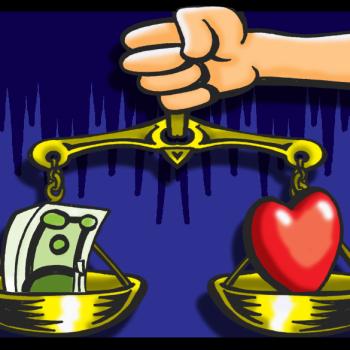Dear friend,
I want you to know first of all that I don't think that your doubt is the fruit of sin. You are a sinner, certainly, we all are; some of us sinners, inexplicably, retain our faith, and some of us don't. There are sinful ways of managing doubt, like handling it un-gently with intimates, or using it as justification for sloth or dishonesty or cruelty, or finding in it evidence of one's own superiority, spiritual or intellectual. I don't think you'll make these mistakes, though.
I think I know a little of what you're facing. Like you, I easily fall under the influence of elegant naturalisms, and like you, I'm frequently persuaded by rational analyses of religious and spiritual phenomena. One of the things I want to convey to you is that I've been able to live well for some time through periodic encounters with doubt. I may be unusual in this way. But if urgent spiritual effort doesn't yield results, consider the possibility that you can stay where you are spiritually for a while, and give it time, a long time. These are the biggest questions, and they deserve maturity and experience on their side.
I generally don't find accounts of other people's spiritual experiences persuasive—I often find them embarrassing, in fact—so I won't give you the specifics of mine. But I have had from time to time what I think of as "irreducible" spiritual intuitions that I think I can distinguish from high emotion and desire, coming as they have without the promptings of high-key sociality or emotion. These experiences are sufficient to sustain my faith in God and the Restoration, the former being for me the more fragile than the latter. I do believe that surer witnesses are available to me and others, though they seem to come infrequently, and I live with the hope and expectation of another, surer revelation.
Your faith is failing, you say, because the feelings you once interpreted as spiritual witnesses have decamped, and look in hindsight more like wishful delusion than personal revelation. I certainly recognize this variety of doubt: As I said above, the spiritual intuitions I rely on most are, circuitously, the ones that don't come at moments of high social or emotional pitch, precisely because (I judge that) I'm therefore less likely to mistake wishes or delusions for revelation.
But more and more I'm wondering if this subtractive method is wrong, if after all I'm wrong to strip away the layers of desire and story and emotion and memory in search of the hard bright penny of positive knowledge. Could it be instead that desire and story and all the rest aren't, as I've thought, counterfeit revelation, but are in fact the elemental substances of revelation, and that in personal revelation God invites us to make meaning with him?
To be a conscious human is to transform sensory information into, precisely, desire and story and memory and feeling. Presumably it is this capacity for consciousness that sets apart humanity as the family of God, that is, in fact, the image of the divine in us. To receive personal revelation, then, might not be so much a problem of tuning out the static of self and tuning in the celestial frequency, but rather of heightening the processes of consciousness, of mingling our own faculties with God's to make meaning out of sensations and information unorganized. Which is to say, maybe it is wishful thinking, and maybe that's exactly how it ought to be.
When you see a family posed in prayer, the deacons at the solemn choreography of the sacrament, supplicants and congregants giving body to the rituals and mind to the myths—how could such unnatural beauty draw its substance from anything else but desire and story and feeling and memory? A million hard bright pennies, for all their value, couldn't begin to do the trick.
7/5/2011 4:00:00 AM





